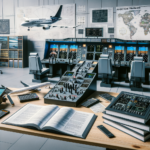Understanding Aviation Training Programs
In the dynamic world of aviation, training is the cornerstone that ensures safety, efficiency, and excellence. Aviation training programs are designed to equip individuals with the necessary skills and knowledge to operate safely and effectively in various roles within the industry. These programs range from pilot training to aircraft maintenance, air traffic control, and passenger service. Each program is tailored to meet specific regulatory requirements and industry standards, ensuring that trainees are well-prepared for their respective roles.
Pilot training, for instance, is a comprehensive program that includes ground school, simulator training, and actual flight hours. It covers essential topics such as aerodynamics, navigation, meteorology, and aircraft systems. On the other hand, aircraft maintenance training focuses on the technical aspects of aircraft operation, including the repair and maintenance of engines, avionics, and airframes. This diversity in training programs reflects the multifaceted nature of the aviation industry, where each role plays a crucial part in ensuring the smooth operation of air travel.
Moreover, aviation training is not limited to technical skills. Many programs also emphasize the development of soft skills such as communication, teamwork, and problem-solving. These skills are vital in an industry where collaboration and quick decision-making are often required. As the aviation industry continues to evolve, training programs are also adapting to incorporate new technologies and methodologies, ensuring that trainees are equipped with the latest knowledge and skills.
Finding the Right Training Program in the UK
The United Kingdom offers a wide array of aviation training programs, catering to various career paths within the industry. Whether you’re aspiring to be a pilot, an air traffic controller, or an aircraft engineer, there’s a training program available to suit your needs. When choosing a training program, it’s essential to consider factors such as accreditation, course content, and the reputation of the training institution.
Accreditation is a crucial factor as it ensures that the training program meets the required standards set by aviation authorities. In the UK, programs accredited by the Civil Aviation Authority (CAA) are highly regarded and recognized internationally. Additionally, prospective trainees should evaluate the course content to ensure it covers all necessary areas and provides a comprehensive understanding of the subject matter. Institutions with a strong track record of producing successful graduates often have a well-structured curriculum and experienced instructors.
It’s also beneficial to consider the facilities and resources available at the training institution. State-of-the-art simulators, modern classrooms, and access to real aircraft can significantly enhance the learning experience. Furthermore, some programs offer partnerships with airlines or aviation companies, providing trainees with valuable work experience and networking opportunities. By thoroughly researching and selecting the right training program, aspiring aviation professionals can set themselves on a path to a successful career in the industry.
Career Opportunities in Aviation Post-Training
Upon completing an aviation training program, a world of career opportunities opens up within the industry. The aviation sector is diverse, offering roles in various fields such as piloting, aircraft maintenance, air traffic control, and airport management. Each role requires a unique set of skills and knowledge, which are imparted through specialized training programs.
For those who have completed pilot training, the most common career path is to become a commercial airline pilot. This role involves flying passengers and cargo on scheduled flights, requiring excellent flying skills and a thorough understanding of aviation regulations. Alternatively, some pilots choose to work in charter services, corporate aviation, or even as flight instructors.
Aircraft maintenance engineers, on the other hand, play a critical role in ensuring the safety and airworthiness of aircraft. Their responsibilities include performing routine checks, troubleshooting technical issues, and conducting repairs. With the increasing complexity of modern aircraft, the demand for skilled maintenance engineers is on the rise.
Air traffic controllers are responsible for managing the safe and efficient flow of air traffic. This role requires excellent communication skills, quick decision-making, and the ability to work under pressure. In addition to these roles, there are numerous opportunities in airport operations, passenger services, and aviation management. The aviation industry is continually evolving, and with the right training and qualifications, individuals can pursue rewarding and fulfilling careers.








